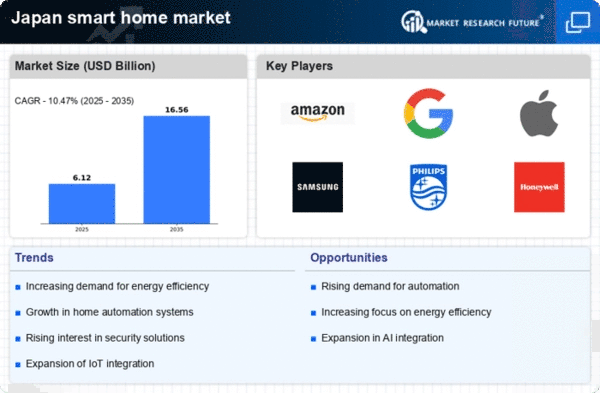Government Initiatives and Support
The Japanese government is actively promoting the adoption of smart home technologies as part of its broader strategy to enhance energy efficiency and sustainability. Initiatives such as subsidies for energy-efficient appliances and tax incentives for smart home installations are encouraging consumers to invest in these technologies. The government aims to reduce greenhouse gas emissions by 26% by 2030, and smart home solutions are seen as a crucial component in achieving this target. As a result, the smart home market is likely to benefit from increased consumer participation and investment, potentially leading to a market valuation of over $10 billion by 2030.
Rising Consumer Awareness and Demand
Consumer awareness regarding the benefits of smart home technologies is on the rise in Japan, significantly impacting the smart home market. As individuals become more informed about energy savings, security enhancements, and convenience, the demand for smart devices is increasing. Surveys indicate that around 60% of Japanese consumers express interest in adopting smart home solutions, particularly in urban areas where space is limited. This growing demand is likely to encourage manufacturers to innovate and expand their product offerings, further stimulating market growth. The smart home market is expected to see a compound annual growth rate (CAGR) of approximately 15% over the next five years, reflecting this heightened consumer interest.
Enhanced Security Features and Concerns
Security remains a paramount concern for homeowners in Japan, driving the demand for smart home technologies that offer enhanced security features. The rise in urban crime rates has led consumers to seek solutions such as smart locks, surveillance cameras, and alarm systems that can be monitored remotely. Approximately 70% of consumers indicate that security features are a primary factor in their decision to adopt smart home technologies. This heightened focus on security is likely to propel the smart home market, as manufacturers continue to innovate and provide advanced security solutions that cater to consumer needs.
Integration of Renewable Energy Sources
The integration of renewable energy sources into smart home systems is becoming increasingly prevalent in Japan, influencing the smart home market. Homeowners are now more inclined to install solar panels and energy storage systems that can be managed through smart home applications. This trend not only promotes energy independence but also aligns with Japan's commitment to reducing reliance on fossil fuels. As of 2025, it is estimated that around 25% of new homes will incorporate renewable energy solutions, thereby enhancing the appeal of smart home technologies. This integration is likely to drive market growth as consumers seek to optimize energy usage and reduce costs.
Technological Advancements in Home Automation
The smart home market in Japan is experiencing a surge. This is due to rapid technological advancements in home automation. Innovations in artificial intelligence (AI) and machine learning are enabling devices to learn user preferences, thereby enhancing convenience and efficiency. For instance, smart thermostats can adjust temperatures based on user behavior, potentially reducing energy consumption by up to 30%. Furthermore, the integration of voice-activated assistants is simplifying user interactions with smart devices. As of 2025, the market for home automation systems is projected to reach approximately $5 billion, indicating a robust growth trajectory. This technological evolution is likely to attract more consumers, thereby driving the smart home market.
















